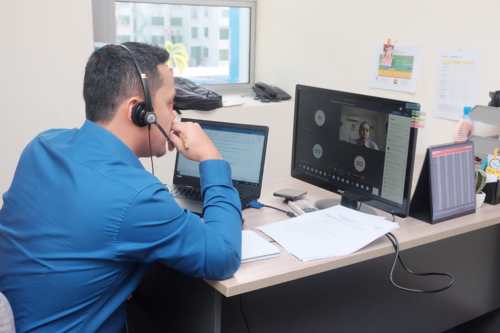Brunei Darussalam's 1st 5G Task Force Plenary Meeting

The first Brunei Darussalam 5G Task Force Plenary Meeting was held online today and was chaired by Yang Mulia Ir. Awg Hj Jailani bin Hj Buntar, Acting Chief Executive of the Authority for Info-communications Technology Industry of Brunei Darussalam (AITI). The inaugural meeting gathered about 60 key working group members to discuss the objectives of the Task Force and how we can collaborate to achieve the deliverables.
The 5G Task Force is established with the aim to increase readiness in the implementation of 5G technology in Brunei Darussalam. The 5G technology with its high-speed mobile broadband is set to revolutionise the connectivity in the years ahead thus opening up endless opportunities for the development of innovative services in the industries and enhance economic growth in the country. This new development aims to realise the government's aspiration in ensuring the ICT sector as one of the key catalysts towards achieving Brunei Darussalam's Vision 2035 and in transforming Brunei Darussalam as a Smart Nation.
The 5G Taskforce consists of three working groups with members from ministries, government agencies, telecommunications service providers, equipment vendors, academia and industry. The working groups are:
- Working Group 1: Policy, Regulatory and Spectrum, to be co-chaired by the Ministry of Transport and Infocommunications (MTIC) and the Authority for Info-communication Technology Industry of Brunei Darussalam (AITI);
- Working Group 2: Use Cases, Applications and Infrastructure, to be chaired by Unified National Network (UNN);
- Working Group 3: Education and Awareness, to be co-chaired by the Authority for Info-communication Technology Industry of Brunei Darussalam (AITI) and Universiti Teknologi Brunei (UTB).
The chairpersons of 5G Taskforce Working Groups have outlined work plans and set target deliverables to be carried out within a year of its establishment.
Several distinguished speakers have been invited to present during the meeting namely:
- Mr. Aamir Riaz from the International Telecommunication Union (ITU) Programme Office for Regional Office Asia and the Pacific who would be headlining on the Introduction on 5G and Regional Development of Policy, Regulatory and Spectrum;
- Mr. Raymond Soh, Vice President Network Solutions of Ericsson, who would be presenting on the outlook for 5G and its challenges;
- Mr. Abdul Razaque Memon, Vice President IoT and 5G Solutions of Huawei Asia Pacific, who would be sharing on 5G Use Cases and Development, and
- Mr. Nicolas Guillou, Co-Founder and Managing Director of Anian, who would be highlighting on Education and Skill Development for Future Industry.
5G Taskforce will hold several working groups and plenary meetings throughout the year and is expected to complete the study and produce a final report on 5G implementation in Brunei Darussalam to be submitted to the Minister of Transport and Infocommunications.
The support of the Task Force members is crucial to the success of the 5G project as their input and contribution will go from strength to strength. AITI sincerely hopes that all stakeholders involved will provide their full commitment and cooperation throughout the project commencement.
On 30 March 2020, AITI has established a "5G regulatory sandbox" to facilitate the development of 5G technology in Brunei Darussalam. The sandbox gives opportunity for qualified companies to carry out trials on 5G technology and its innovations. Under this sandbox, AITI is providing fee exemption on its license, spectrum and importation fees. For more information regarding 5G regulatory sandbox, please contact Norshahrul Nizam bin Othman, Assistant Chief Executive, Resource Management Unit at nizam.othman@aiti.gov.bn.
What is 5G?
The name "5G" stands for fifth-generation mobile networks. 5G will lead to over a 10 times increase in data speed, low latency and enhanced ability to support millions of connected devices. Many of the latest tech buzzwords linked to 5G include: artificial intelligence (AI), autonomous vehicles, the "Internet of Things" (IoT), big data, smart grid technology and augmented reality (AR).
The move to 5G will create huge opportunities for many industries. It is able to transform the lives of people around the world through improved accessibility where connected appliances can help automate tasks around the house; beyond mobile broadband where opportunities to connect people with environment via Virtual Reality and Augmented Reality are made possible as well as improvement in safety, health and security in cases like mission-critical services such as remote surgery, better traffic management and other applications that require instant response time.

